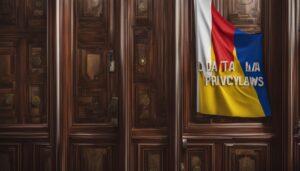Understanding DeFi Taxation Regulations in Romania
In Romania, it is important for cryptocurrency investors to be aware of the DeFi taxation regulations surrounding decentralized finance (DeFi) and digital assets.
The country considers cryptocurrency as income from alternative sources, subject to the existing income tax rules.
While the Agenția Națională de Administrare Fiscală (ANAF) has not provided specific guidelines on crypto taxation, there are key principles to keep in mind.
According to Romanian tax laws, income from crypto transactions is subject to a flat Personal Income Tax (PIT) rate of 10%.
This applies to income from activities such as selling, swapping, or spending crypto assets.
Likewise, crypto capital gains are also taxed at the same rate under the existing income tax laws.
It is worth noting that the ANAF has the ability to track crypto transactions due to EU regulations on anti-money laundering.
Losses from crypto can be deducted and carried forward for up to 7 years, providing a potential tax benefit to investors.
While the ANAF has not explicitly defined the cost basis method for calculating gains and losses, methods such as FIFO, LIFO, and average cost basis are generally accepted.
This allows investors to choose the most suitable method for their individual circumstances.
Additionally, income from activities like crypto mining, staking, and earning tokens through DeFi protocols is also subject to income tax at a rate of 10%.
However, certain tax-free transactions are exempted, including purchasing crypto using fiat currency, gifting crypto, transferring between wallets, and HODLing crypto assets.
As the fintech industry continues to evolve in Romania, it is crucial for crypto enthusiasts and investors to stay informed about the latest tax laws and regulations.
By understanding the DeFi taxation landscape, you can ensure compliance with the authorities and make informed decisions regarding your crypto investments.
How Crypto Taxation Works in Romania
In Romania, crypto taxation follows the existing income tax laws.
When you sell, swap, or spend your crypto assets, the gains from these transactions are considered disposals and are subject to a PIT (Personal Income Tax) rate of 10%.
It’s important to note that losses from crypto investments are not taxable and can be used to offset any gains you may have.
However, the responsibility of calculating gains and losses falls on the investor, and the cost basis method for these calculations is not explicitly defined by the Agenția Națională de Administrare Fiscală (ANAF).
To provide clarity, let’s take a look at an example of how gains are calculated in Romania.
Suppose you purchase 10 ETH for a total of 20,000 RON and later sell them for 30,000 RON.
You would have a gain of 10,000 RON (30,000 RON – 20,000 RON), which would be subject to the 10% PIT rate. In this case, you would owe 1,000 RON in taxes (10,000 RON x 10%).
Calculating Crypto Gains and Losses in Romania
When it comes to calculating gains and losses, there are various cost basis methods you can use, such as FIFO (First-in, First-out), LIFO (Last-in, First-out), or average cost basis.
However, it’s important to note that the specific method to be used is not explicitly defined by the ANAF.
Therefore, it’s advisable to consult with a tax professional or accountant who can assist you in determining the most appropriate cost basis method for your crypto investments.
| Cost Basis Method | Description |
|---|
| FIFO (First-in, First-out) | The method assumes that the assets you acquired first are the ones you sell or dispose of first. |
| LIFO (Last-in, First-out) | The method assumes that the assets you acquired most recently are the ones you sell or dispose of first. |
| Average Cost Basis | The method calculates the average cost of all the assets you acquired and uses this average cost to determine the gains or losses when you sell or dispose of them. |
By understanding how crypto taxation works in Romania and calculating your gains and losses accurately, you can ensure compliance with the country’s tax regulations while managing your crypto investments effectively.
Crypto Income Tax in Romania
When it comes to crypto income tax in Romania, it’s important to understand the regulations and requirements.
Income from activities such as crypto mining, staking, earning tokens through DeFi protocols, and other sources is subject to income tax at a rate of 10%.
This means that if you receive income from these activities, you are responsible for reporting and paying taxes on it.
To calculate your crypto income in Romania, you need to add the fair market value of all tokens received and pay personal income tax (PIT) on the total amount.
Keep in mind that the cost basis method for calculating gains and losses is not explicitly defined by the Agenția Națională de Administrare Fiscală (ANAF), so it’s important to consult with a tax professional or accountant for guidance on the best method to use.
It’s also worth noting that not all crypto transactions are taxable.
Certain transactions, such as purchasing crypto using fiat currency, gifting crypto, transferring between wallets, and HODLing crypto assets, are considered tax-free.
This means that you don’t have to report or pay taxes on these types of transactions.
However, it’s important to keep detailed records of all your crypto transactions to ensure accurate reporting.
Summary:
- Crypto income in Romania is subject to a 10% personal income tax rate.
- To calculate your crypto income, add the fair market value of all tokens received.
- Consult with a tax professional for guidance on the best method to calculate gains and losses.
- Certain crypto transactions, such as purchasing crypto using fiat currency, gifting crypto, transferring between wallets, and HODLing crypto assets, are tax-free.
- Keep detailed records of all your crypto transactions for accurate reporting.
| Taxable Crypto Activities | Tax Rate |
|---|
| Crypto mining | 10% |
| Staking | 10% |
| Earning tokens through DeFi protocols | 10% |
By understanding the crypto income tax regulations in Romania, you can ensure compliance and avoid any potential penalties or legal issues.
It’s recommended to consult with a tax professional who specializes in cryptocurrency taxation to navigate the complexities of this evolving landscape.
Regulatory Landscape for Fintech in Romania
In Romania, the government has shown a positive attitude towards blockchain and cryptocurrencies, recognizing their potential benefits.
The regulatory landscape for fintech in Romania largely follows the guidelines issued by the European Union (EU), with EU regulations on blockchain and cryptocurrencies influential in shaping the local regulations.
The government has taken steps to regulate activities related to blockchain and cryptocurrencies in sensitive areas such as tax, anti-money laundering (AML)/know your customer (KYC) procedures, and criminal law.
To strengthen crypto regulation, the government has adopted Emergency Ordinance No. 111/2020.
One notable provision of the ordinance is that the provision of crypto-to-fiat exchange services and digital wallet services requires authorization and/or registration.
The government is in the process of implementing regulations for these services to ensure compliance and consumer protection.
These regulatory efforts aim to foster a more secure and transparent environment for fintech activities.
Table: Overview of Fintech Regulations in Romania
| Area | Regulatory Aspect |
|---|
| Tax | Income and capital gains from crypto transactions are subject to income tax at a rate of 10% |
| AML/KYC | Crypto service providers must comply with AML and KYC procedures to prevent money laundering and illicit activities |
| Criminal Law | Regulations in place to address potential criminal activities associated with blockchain and cryptocurrencies |
| Authorization and Registration | Provision of crypto-to-fiat exchange services and digital wallet services requires authorization and/or registration |
Romania also actively contributes to EU initiatives and projects related to blockchain and digitalization.
By participating in these initiatives, Romania aims to stay up-to-date with international standards and foster collaboration in the fintech sector.
Overall, the regulatory landscape for fintech in Romania is evolving, with the government taking proactive steps to keep pace with technological advancements in the sector.
These efforts aim to create a conducive environment for fintech innovation while safeguarding consumer interests and maintaining financial stability.
Funding Options for Fintech Startups in Romania
When it comes to funding options for fintech startups in Romania, there are several avenues to explore.
Whether you’re looking for equity financing or debt funding, the Romanian market offers opportunities for entrepreneurs to secure the capital they need to bring their innovative ideas to life.
Equity Funding
Equity funding is a common option for fintech startups in Romania.
This type of funding involves selling shares of your company to investors in exchange for capital.
By giving up a portion of ownership, you can attract investors who believe in your business model and its potential for growth. Equity funding can come from angel investors, venture capital firms, or even crowdfunding platforms.
Debt Funding
Debt funding is another option for fintech startups in Romania.
This type of funding involves taking out a loan or line of credit to finance your operations.
Unlike equity funding, you retain full ownership of your company, but you are responsible for repaying the borrowed capital along with any interest or fees.
Debt funding can come from traditional banks, alternative lenders, or even government-backed programs.
| Funding Option | Pros | Cons |
|---|
| Equity Funding | - Potential for access to larger amounts of capital
- Partnership with experienced investors who can provide guidance and connections
| - Loss of ownership and control
- Potential dilution of equity
- Complex legal agreements and negotiations
|
| Debt Funding | - Retain full ownership and control
- No equity dilution
- Flexible repayment terms
| - Interest payments and fees
- Creditworthiness and collateral requirements
- Potential for personal liability
|
When considering funding options for your fintech startup in Romania, it’s important to carefully evaluate your business needs, growth potential, and risk tolerance.
Each funding option has its own advantages and disadvantages, so it’s crucial to choose the one that aligns best with your long-term goals and vision for success.
Remember, regardless of the funding option you choose, it’s essential to thoroughly research and understand the legal and regulatory requirements associated with raising capital in Romania.
Consult with legal and financial professionals who specialize in fintech to ensure compliance and make informed decisions for your startup’s financial future.
The Fintech Market in Romania
Romania has witnessed a significant growth in its fintech market in recent years, with the emergence of various fintech companies in sectors such as blockchain, crowdfunding, banking, e-commerce, lending, and payment gateway.
The COVID-19 pandemic has further accelerated the adoption of online services and digital solutions in several sectors, including healthcare and insurance.
As a result, fintech solutions such as payment applications, decentralized finance (DeFi) projects, peer-to-peer lending protocols, and neo-banking have gained popularity among the Romanian population.
The fintech market in Romania shows great potential for further growth and the emergence of fintech unicorns.
With the government prioritizing digital transformation and innovation, Romania aims to stay on the cutting edge of technological advancements.
Blockchain technology is expected to play a pivotal role in future developments, and innovative approaches like data science and machine learning are anticipated as the market continues to mature.
Additionally, Romania is focusing on environmental, social, and governance (ESG) objectives and aims to implement ESG guidelines in the Bucharest Stock Exchange.
The government is actively working towards supporting innovation and the creation of valuable intellectual property by encouraging local talent and providing funding for research and technology.
With a conducive regulatory environment and a growing ecosystem, Romania is poised to continue its fintech development and contribute to the global fintech landscape.
Fintech Innovation Trends in Romania
1. Blockchain Integration: Romania recognizes the potential of blockchain technology and is actively exploring its applications in various industries, including finance.
The integration of blockchain technology is expected to enhance security, transparency, and efficiency in financial transactions, leading to the development of innovative fintech solutions.
2. Digital Payments: The adoption of digital payment solutions is rapidly increasing in Romania, driven by the convenience and speed they offer.
Mobile payment applications, contactless payments, and e-wallets are gaining popularity among Romanian consumers, providing opportunities for fintech companies to innovate and provide seamless payment solutions.
3. Open Banking: Romania is embracing the concept of open banking, which allows third-party financial service providers to access customer data from traditional banks through secure APIs.
This opens up opportunities for new fintech players to offer personalized financial services and products to customers, fostering competition and innovation in the market.
| Trend | Key Impact |
|---|
| Blockchain Integration | Enhanced security, transparency, and efficiency in financial transactions. |
| Digital Payments | Increased convenience and speed of transactions. |
| Open Banking | Opportunities for personalized financial services and products. |
Future Outlook for Fintech in Romania
The future of fintech in Romania is poised for remarkable growth as the government places a strong emphasis on digital transformation and innovation.
With blockchain technology set to play a central role in future technological advancements, the country is well positioned to harness the potential of decentralized finance and revolutionize the financial landscape.
As the fintech market matures, Romania is expected to adopt innovative approaches such as data science and machine learning. These cutting-edge technologies will enable businesses to uncover valuable insights, enhance decision-making processes, and optimize customer experiences.
By leveraging these tools, fintech companies can unlock new opportunities and stay ahead in the dynamic market.
Furthermore, Romania is committed to promoting environmental, social, and governance (ESG) objectives.
The implementation of ESG guidelines in the Bucharest Stock Exchange highlights the government’s dedication to sustainable practices.
By prioritizing ESG principles, Romania aims to create a robust and responsible fintech ecosystem that aligns with global standards.
The Future is Digital for Romania
Digitalization continues to be a key focus for Romania.
With an increasing number of individuals embracing online services and digital solutions, the demand for innovative fintech solutions is on the rise.
Payment applications, DeFi projects, peer-to-peer lending protocols, and neo-banking are gaining popularity, making fintech an integral part of everyday life for many Romanians.
Moreover, the Romanian government is committed to supporting local talents and fostering technological advancements.
By encouraging innovation and providing funding for research and technology, Romania aims to create an environment conducive to the development of valuable intellectual property.
These efforts further solidify Romania’s position as an emerging hub for fintech innovation.
In conclusion, the future of fintech in Romania holds immense potential.
With a strong focus on digitalization, innovation, and ESG principles, Romania is poised to become a thriving fintech ecosystem that not only meets the evolving needs of its population but also contributes to the global fintech landscape.
Tax Considerations for DeFi FAQ
1. What is the tax treatment for DeFi activities in Romania?
According to the Romanian tax system, income obtained from DeFi activities are subject to taxation.
The applicable tax regime will depend on various factors such as the legal entity involved and the nature of the income.
It is important to consult the Romanian tax code and seek guidance from the National Agency for Fiscal Administration to understand the specific tax obligations.
2. Are there any tax exemptions available for DeFi in Romania?
Currently, there are no specific tax exemptions for DeFi activities in Romania.
However, certain deductions and allowances may be applicable based on the existing tax legislation.
It is advised to consult a tax professional or the tax authorities to determine the available tax benefits.
3. How is the income obtained from DeFi activities taxed in Romania?
The income obtained from DeFi activities is subject to personal income tax in Romania.
The tax rate depends on the individual’s total taxable income and the applicable tax brackets.
It is important to keep track of the income generated from DeFi activities and report it accurately in the annual tax return.
4. What are the tax authorities responsible for overseeing DeFi taxation in Romania?
The National Agency for Fiscal Administration (ANAF) is the authority responsible for overseeing tax matters in Romania.
They provide guidance, implement tax policies, and ensure compliance with the tax laws, including those related to DeFi activities.
It is advisable to refer to their official website or consult with them directly for specific tax queries.
5. How does DeFi taxation differ for individuals and legal entities in Romania?
DeFi taxation in Romania differs for individuals and legal entities.
Individuals are subject to personal income tax on the income obtained from DeFi activities, while legal entities may be subject to corporate income tax.
It is essential to understand the tax regime applicable to your specific situation and comply with the respective tax obligations.
6. Are there any specific tax changes anticipated for DeFi in Romania?
As tax laws and regulations are subject to change, it is possible that specific tax changes may be introduced in the future regarding DeFi activities in Romania.
It is advisable to stay updated with the latest tax legislation and consult with tax professionals or the tax authorities to ensure compliance with any new tax requirements.
7. Are there any tax treaties that Romania has signed regarding DeFi taxation?
Romania has signed double tax treaties with several countries to avoid double taxation and regulate tax matters, including those related to DeFi activities.








 Market Channels for AI and ML Software Development Services in Romania
Market Channels for AI and ML Software Development Services in Romania








 Timeline Item 1
Timeline Item 1